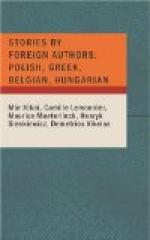“What is the matter, Riekje?” cried Dolf suddenly, “you are as white as those plates in the cupboard, and your eyes are closed. My Riekje, what is the matter with you?”
“Ah! Dolf,” replied Riekje, “if it were to happen to-day! I have been in pain all the afternoon, and now I feel worse. My child! If I die, you will love it, Dolf, dear?”
“Mother! Mother!” cried Dolf, “I am sick at heart.”
Then he hid his face in his big hands and began to sob, without knowing the reason.
“Come, Dolf, be brave,” said Tobias, tapping him on the shoulder. “We have all gone through this!”
“Riekje, Riekje, my heart!” said Nelle in tears, “no greater happiness could come to us on Saint Nicholas day. Poor folk rejoice more over a child that is born to them, than over all the treasures in the world, but the child whom God sends on Easter Day or St. Nicholas day is above all welcome.”
“Dolf, you can run better than I can,” said Tobias. “Run and fetch Madame Puzzel; we will look after Riekje.”
Then Dolf pressed Riekje once more to his heart, and ran up the ladder. The plank which connected the boat with the shore shook as he crossed it.
“He is already a long way off,” said Tobias.
III.
The night hung over the town like a great bird, but it had snowed on the preceding days, and through the darkness Dolf could see the blanched face of the earth, white as the face of the dead. He ran full speed along the river bank as one pursued by the tide, though, even then, his footfall was not so rapid as the beating of his heart. The distant lights through the fog seemed to him like a procession of taper-bearers at a funeral; he did not know how this idea arose, but it terrified him, for behind it again he saw death. Then he came upon silent figures hastening mysteriously along.
“Doubtless, they have been suddenly called to the bedside of the dying,” he muttered.
It was now he remembered that it is customary in Flanders on that night to replace the hay, carrots, and turnips which the little ones put on the hearth to feed Saint Nicholas’ ass, by big dolls, wooden horses, musical instruments, violins, or simply by mannikins in spikelaus, according as each can afford.
“Ah,” he said to himself, comforted, “they are fathers and mothers going to the shops.” But now the gloomy lights which resembled the taper-bearers seemed to be chasing one another along the quays; their little flames ran in every direction, crossed one another, and looked like big fireflies. “I must see double,” he said, “the fireflies can be in my brain only.”
Suddenly he heard voices, calling, crying out, lamenting.
Torches moved to and fro on the river bank, their red tongues of flame blown by the wind amid clouds of smoke. In the uncertain light he could at last distinguish figures rushing about, others leaning over the river, black as well. This explained everything: the lamps had not moved, but he had been misled by the flitting torches.




